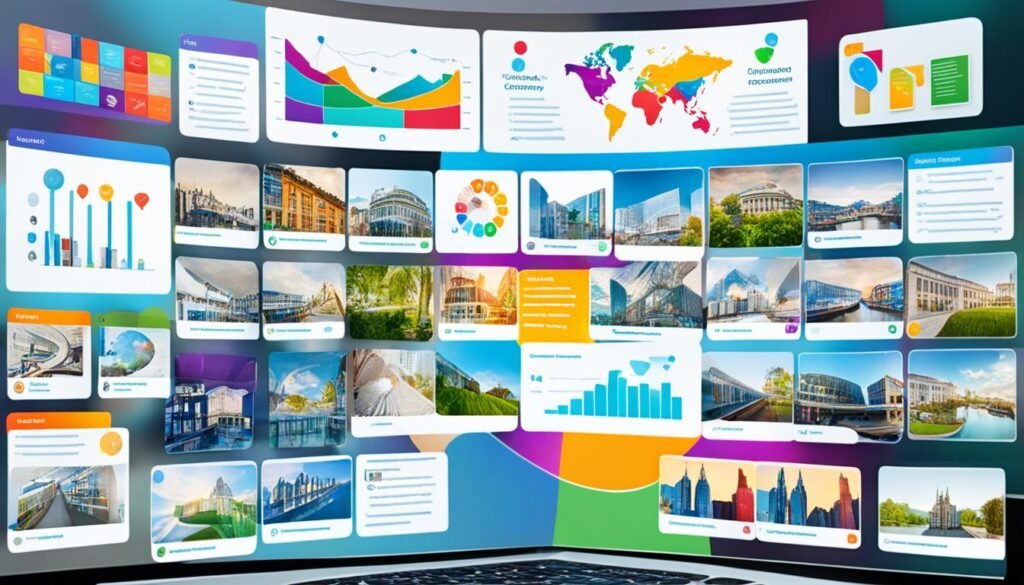In recent years, the concept of traditional education has undergone a radical transformation with the rise of online education. The internet and new technologies have made it possible for people to access quality education from anywhere at any time. Online education offers convenience, flexibility, and a growing role in modern learning, making it a viable option for students of all ages.
Also Read: Exploring Excellence: Trine University Academic Journey
Key Takeaways:
- Online education provides convenient and flexible learning opportunities from anywhere.
- Students and teachers can set their own pace and schedule, promoting a better work-study balance.
- A wide selection of programs is available, offering various levels and disciplines.
- Online education provides accessibility to education worldwide, eliminating the need for commuting.
- Personalized and tailored learning experiences enhance the learning process.
Also Read: What Makes Roosevelt University A Leader In Urban Education?
The Flexibility of Online Education
Online education offers a multitude of benefits, and one of its key advantages is the flexibility it provides. With online learning, students and teachers have the freedom to set their own learning pace and create a schedule that suits their individual needs. This flexibility allows for a better work-study balance, enabling students to juggle their educational pursuits alongside their other responsibilities.
By embracing online education, learners gain valuable time management skills. They develop the autonomy to take charge of their learning journey and allocate their time effectively. Online education promotes self-discipline and independence, as both students and teachers take on new responsibilities in the virtual classroom.
With online education, learning is not confined to a specific location or time. Students can access their course materials and participate in discussions from anywhere in the world, at any time that is convenient for them. The convenience and flexibility of online learning make it an ideal choice for individuals with busy schedules, working professionals, and those seeking to strike a balance between their studies and personal commitments.
Also Read: Exploring Excellence: The Legacy Of West Coasts University
The flexibility of online education is further enhanced by the variety of learning formats and resources available. Whether it’s through live virtual classes, pre-recorded lectures, interactive learning platforms, or collaborative group projects, online education offers diverse learning experiences that cater to different learning styles.
| Benefits of Online Education | Keywords |
|---|---|
| Flexibility in setting learning pace and schedule | online education, flexible learning |
| Improved work-study balance | work-study balance |
| Development of time management skills | time management skills |
| Promotes autonomy and self-discipline | autonomy |
| Convenient access to learning materials | online education |
Overall, the flexibility offered by online education empowers individuals to pursue their educational goals while maintaining a healthy work-study balance. It equips them with essential time management skills and fosters a sense of autonomy. As online education continues to evolve, it continues to provide individuals with a convenient and flexible learning experience.
Wide Selection of Programs in Online Education

Online education offers a wide range of programs across various levels and disciplines, making it a versatile and accessible option for learners of all backgrounds. Universities and higher education schools have embraced the digital age by offering online versions of their programs, allowing students to pursue their interests and acquire new skills without the need to physically attend a campus.
Whether you’re interested in music composition, quantum physics, or any other field, online education provides options for every type of student. From undergraduate certificates to advanced degrees, you can find the program that aligns with your goals and aspirations.
Also Read: Exploring Academic Excellence: Montclair State University
Furthermore, online programs provide official certificates, diplomas, and degrees upon successful completion. These credentials are recognized and respected in the academic and professional world, giving you a competitive edge in the job market.
Explore the various levels and disciplines available in online education:
- Undergraduate programs
- Graduate programs
- Certificate programs
- Professional development courses
Whether you’re looking to earn a degree, enhance your skills, or change your career path, online education offers a wealth of opportunities to achieve your goals.
| Discipline | Programs |
|---|---|
| Business |
|
| Healthcare |
|
| Information Technology |
|
| Education |
|
As you can see, the selection of online programs spans various disciplines, ensuring there is something for everyone. Whether you’re interested in pursuing a degree in business, healthcare, information technology, education, or any other field, online education provides the flexibility and accessibility to make it happen.
Online education opens doors to new opportunities and empowers you to take control of your learning journey. With a wide selection of programs and the convenience of studying from anywhere, you can embark on a path of personal and professional growth.
Don’t miss out on the chance to explore the wide range of programs available in online education and take the next step towards achieving your goals!
Accessibility of Online Education

Online education offers unparalleled accessibility, allowing students to study and learn from anywhere in the world. With online learning, there is no need to commute to a physical location, eliminating the time and cost associated with travel. Students can access the virtual classroom wherever there is an internet connection, providing the flexibility to study while on the go or living in different locations. This accessibility opens up a world of opportunities for students to continue their education while exploring new and exotic places.
Also Read: What Are The Core Courses In A Bachelor Degree In Education Program?
By removing the need for commuting, online education not only saves time but also offers significant cost-saving benefits. Students can avoid expenses related to transportation, parking, and other campus-related costs, allowing them to allocate their resources more efficiently. Furthermore, the flexibility of online education enables students to pursue travel opportunities without hindering their education. Whether studying from a coffee shop in Paris or a beach resort in Bali, online education empowers students to have enriching experiences while furthering their academic pursuits.
Benefits of Accessibility in Online Education
“Online education provides students the freedom to study and learn from anywhere, breaking down geographical barriers and providing equal access to quality education.”
– Jane Smith, Online Education Expert
The accessibility of online education not only benefits individual students but also contributes to a more inclusive and diverse learning environment. Students from different backgrounds and locations can come together in virtual classrooms, bringing unique perspectives and experiences to the learning process. This diversity enhances collaborative learning and fosters a global community of learners.
Comparison of Online Education and Traditional Learning
| Aspects | Online Education | Traditional Learning |
|---|---|---|
| Study Location | Can study from anywhere | Restricted to a physical campus |
| Commuting | No commuting required | Time-consuming and costly commuting |
| Cost-Saving | Potential savings on transportation and living expenses | Additional expenses for commuting and campus living |
| Travel Opportunities | Flexible learning while traveling | Travel may interrupt education |
By offering accessibility, convenience, and cost-saving opportunities, online education has revolutionized the learning landscape. It has made quality education available to individuals who may not have had access to it in the past, promoting lifelong learning and personal development. As technology continues to advance, online education will only become more accessible and inclusive, shaping the future of education.
Customized Learning Experience in Online Education

Online education offers a personalized learning experience that caters to the unique needs and preferences of students. With small class sizes, students have more opportunities for interaction and individualized attention from their teachers. This enables a more engaging and collaborative learning environment, fostering a sense of community and support.
Online platforms provide access to diverse learning materials, including videos, photos, eBooks, and interactive forums. These resources enrich the learning experience by presenting information in various formats, catering to different learning styles. Students can explore these materials at their own pace and delve deeper into topics that interest them, enhancing their understanding and knowledge retention.
“The online learning environment enables a tailor-made education that empowers students to take ownership of their learning journey and customize it according to their individual requirements and abilities.”
The flexibility of online education allows students to learn at times that work best for them. Whether they are early birds or night owls, students can access their coursework and engage with learning materials whenever they are most productive. This personalized approach to scheduling promotes effective time management skills and empowers students to take control of their own learning.
Unlocking Potential with Personalized Learning
Online education’s personalized learning experience goes beyond traditional teaching methods. It adapts to the needs of each student, focusing on their strengths and areas for improvement. This individualized approach enables students to progress at their own pace, ensuring they grasp concepts fully before moving on.
The customized nature of online education provides students with a supportive and inclusive learning environment. It allows for targeted interventions and specialized assistance when necessary. Teachers can identify struggling individuals and offer additional resources or guidance, ensuring that no student gets left behind.
Enhanced Engagement and Interaction
By its very nature, online education fosters collaboration and interaction among students. Virtual classrooms provide opportunities for meaningful discussions, group projects, and peer feedback. This not only enhances students’ understanding of the subject matter but also improves their critical thinking, communication, and teamwork skills.
The diverse learning materials available in online education cater to different interests, learning styles, and abilities. Visual learners can benefit from engaging educational videos, while interactive quizzes and simulations can help solidify concepts for hands-on learners. This variety of resources ensures that students can find the approaches that resonate with them most, creating a more effective and engaging learning experience.
Overall, online education offers a customized learning experience that empowers students to take ownership of their education. Whether it’s through small class sizes, diverse learning materials, or tailor-made resources, online education provides the tools and support necessary for students to thrive in their academic journey.
Affordability of Online Education

When considering different options for education, cost is often a major factor for many students. Online education provides a cost-effective alternative to traditional learning methods, making quality education more accessible to a wider range of individuals.
Lower Tuition Fees
One of the key advantages of online education is its cost-effectiveness. Tuition fees for online programs are typically lower compared to traditional brick-and-mortar institutions. This is due to various factors such as reduced infrastructure costs and the elimination of expenses related to campus facilities and maintenance. These savings are then passed on to the students, making online education a more budget-friendly option.
Wide Range of Payment Options
Online education also offers a wide range of payment options to accommodate different financial situations. Students have the flexibility to choose installment plans or opt for per class payments, providing them with the freedom to manage their budget effectively. This flexibility in payment options allows students to tailor their education expenses to their individual financial needs and circumstances.
Scholarships and Discounts
Many online students are eligible for scholarships and discounts, further reducing the cost of their education. Online universities and institutions often offer financial aid programs and scholarships specifically designed for their remote learners. These opportunities help to make online education more financially accessible, bridging the gap for those who may otherwise struggle to afford traditional education.
Savings on Commuting and Materials
Another way online education proves to be cost-effective is by eliminating the need for commuting. Students can attend classes and complete coursework from the comfort of their own homes, saving money on transportation expenses. Additionally, online resources, such as digital textbooks and learning materials, are often available for free or at a lower cost compared to their physical counterparts.
Overall, online education provides an affordable alternative to traditional learning methods. The lower tuition fees, wide range of payment options, availability of scholarships, and savings on commuting and materials make online education a viable and cost-effective choice for those seeking quality education while managing their budget.
Online Education and the Changing Landscape of Learning

Online education is revolutionizing the way we learn, challenging the notion that traditional classroom settings are the only effective means of education. Today, a staggering 90 percent of students believe that online learning is either on par with or superior to the traditional classroom experience. The appeal of online education lies in its ability to provide individualized assessment and a convenient option that caters to the diverse needs and goals of students.
One of the key advantages of online education is its capacity for individualized assessment. In a traditional classroom, it can be challenging for teachers to evaluate each student’s progress and provide personalized feedback. However, online learning platforms offer innovative tools and techniques that facilitate individualized assessment. Through the use of quizzes, tests, and interactive assignments, online educators can gauge each student’s understanding and tailor their instruction accordingly. This ensures that students receive the support they need to excel academically.
Convenience is another important aspect of online education that attracts students from all walks of life. With online learning, students have the flexibility to study at their own pace and in their own preferred environment. There are no rigid schedules or lengthy commutes, as learning can happen anytime and anywhere. This convenient option allows students to balance their education with other commitments, such as work, family, or personal interests. It empowers learners to take control of their educational journey and achieve their goals on their own terms.
Furthermore, online education provides endless opportunities, particularly for international students. The globalization of education has allowed students from different countries to access world-class education without the need for physical relocation. With online learning, students can enroll in prestigious institutions and gain valuable qualifications, regardless of their geographical location. This opens up a world of possibilities and empowers students to expand their horizons, connect with diverse cultures, and broaden their perspectives.
The Benefits of Online Education:
- Individualized assessment enables tailored learning experiences for students.
- Convenient option that offers flexibility and freedom to study at one’s own pace.
- Endless opportunities for international students to access prestigious education.
As we embrace the era of online education, it is crucial to recognize its transformative impact on the learning landscape. It not only challenges traditional classroom settings but also creates an inclusive and accessible learning environment. Online education equips students with the tools and skills they need to thrive in the digital age. Through its same or better than traditional classroom experience, individualized assessment, convenient option, and endless opportunities, online education has become a driving force in shaping the future of learning.
The Transformative Power of eLearning

eLearning, the digital form of education, has revolutionized the learning experience, thanks to its transformative power. In the digital era, personalized learning has emerged as a key aspect of eLearning, allowing students to engage with course material in a way that suits their individual needs and learning styles. With the integration of innovative technologies such as gamification and Augmented Reality (AR)/Virtual Reality (VR), eLearning offers an interactive and immersive environment that captivates learners’ attention.
Gamification, the application of game elements in educational contexts, adds an element of fun and competition to eLearning. By incorporating game-like features such as leaderboards, badges, and rewards, gamification motivates learners to actively participate and progress through the course. This approach not only enhances engagement but also fosters a sense of achievement and accomplishment, driving learners to strive for excellence.
AR and VR technologies take eLearning to a whole new level by providing learners with immersive experiences that simulate real-world scenarios. With AR, learners can overlay digital information onto their physical surroundings, enabling them to visualize concepts in a tangible way. VR, on the other hand, creates artificial environments that replicate real-life situations, allowing learners to practice and apply their knowledge in a risk-free setting. These technologies bring complex subjects to life, making learning more engaging, interactive, and memorable.
“The recent pandemic has accelerated the adoption of eLearning, and schools across the world have embraced online learning techniques in response to the changing times.”
In recent years, eLearning has gained significant momentum as a convenient learning option, particularly in light of the changing times we live in. The COVID-19 pandemic has further accelerated its adoption, making eLearning an essential tool for educational continuity. Schools and educational institutions have rapidly shifted to online platforms, harnessing the power of eLearning to deliver quality education remotely without compromising on academic standards.
Amidst the changing times, eLearning has emerged as a beacon of convenience and flexibility. Learners can access educational content anytime, anywhere, using their preferred device. The ability to learn at one’s own pace removes the constraints of traditional classroom-based education and accommodates diverse learning styles and preferences.
The Impact of eLearning on the Future of Education
eLearning has opened up new possibilities for education by breaking down barriers and expanding access to knowledge. It offers a convenient and flexible learning experience that caters to the needs of a rapidly evolving digital society. As technology continues to advance, the potential of eLearning to revolutionize education remains limitless.
| eLearning Advantages | Description |
|---|---|
| Personalized Learning | eLearning enables personalized learning experiences tailored to individual preferences and needs. |
| Gamification | Integrating game elements in eLearning makes the learning process engaging, motivating, and fun. |
| AR/VR | Immersive technologies like AR and VR provide learners with interactive and realistic learning experiences. |
| Convenience | Learners can access eLearning content anytime, anywhere, offering unparalleled convenience. |
| Changing Times | The recent global events have underscored the importance of eLearning in adapting to changing circumstances. |
As the educational landscape continues to evolve, eLearning will play a pivotal role in shaping the future of learning. Its transformative power, combined with the convenience and flexibility it offers, will continue to drive innovation and revolutionize education for generations to come.
The Advantages of eLearning

eLearning offers numerous advantages for both educators and learners. It provides flexibility in terms of learning timings and access to a wide range of courses. With eLearning, there are no transport hassles and students can learn at their own pace. Moreover, eLearning tends to be more cost-effective than traditional education methods, as it eliminates the need for physical classroom space and reduces overhead costs. These advantages make eLearning a desirable option for students and teachers.
Flexibility in Learning Timings
One of the key advantages of eLearning is the flexibility it offers in terms of learning timings. Students can access course materials and lectures at their convenience, allowing them to learn at their own pace. This flexibility is particularly beneficial for those who are balancing work or other commitments alongside their studies. With eLearning, there is no need to adhere to strict schedules, making it easier to manage time effectively.
Access to a Wide Range of Courses
eLearning provides learners with access to a wide range of courses from various disciplines. Whether it’s academic subjects, professional development, or personal enrichment, eLearning platforms offer a diverse selection of courses to cater to different interests and goals. Students have the opportunity to explore new subjects and acquire skills in areas that are relevant to their personal and professional growth.
No Transport Hassles
One of the practical advantages of eLearning is the elimination of transport hassles. With online courses, students can study from the comfort of their own homes or any location with an internet connection. There is no need to spend time and money commuting to a physical campus, thereby saving valuable resources that can be invested in learning materials or other educational endeavors.
Learn at Your Own Pace
eLearning allows students to learn at their own pace, providing a personalized learning experience. Unlike traditional classroom settings with fixed timetables, eLearning platforms enable learners to review and revisit course materials as needed. Students can spend more time on challenging topics or accelerate through familiar subjects, ensuring a deeper understanding of the content. This flexibility promotes effective learning and enhances knowledge retention.
Lower Costs
Compellingly, eLearning tends to be more cost-effective than traditional education methods. With eLearning, there are no expenses associated with physical classroom space, including maintenance, utilities, and equipment. Students can also save money on commuting, parking, and other related costs. Additionally, eLearning often offers flexible payment options, making education more affordable and accessible to a wider range of learners.
| Advantages of eLearning | Description |
|---|---|
| Flexibility | eLearning allows learners to choose their learning timings and study at their own pace. |
| Access to a Wide Range of Courses | eLearning platforms offer a diverse selection of courses across various disciplines. |
| No Transport Hassles | With eLearning, students can study from anywhere, eliminating the need for commuting. |
| Learn at Your Own Pace | Students can customize their learning experience and review materials as needed. |
| Lower Costs | eLearning is generally more cost-effective, eliminating expenses associated with physical classrooms. |
Overall, eLearning offers a range of advantages that make it an attractive option for both learners and educators. Its flexibility, access to courses, elimination of transport hassles, ability to learn at one’s own pace, and cost-effectiveness contribute to its growing popularity in the modern education landscape.
Bridging the Digital Divide in Online Learning

The digital divide has become a significant issue in online learning, especially for students from lower-income families. Accessing the necessary technology and internet connection for effective learning can be a challenge, creating an inequitable learning environment. However, various efforts are being made by governments, organizations, and school districts to bridge this divide and provide equal opportunities for all students.
“It is essential to ensure that every student has access to the tools and resources necessary for successful online learning,” says Sarah Adams, the director of education initiatives at a nonprofit organization focused on educational equity.
The focus on closing the digital divide encompasses multiple strategies. One crucial aspect is improving broadband access. Governments are working to expand internet connectivity in rural and underserved areas, ensuring that students have reliable and high-speed internet connections at home. Increasing access to broadband not only facilitates online learning but also opens up opportunities for students to explore educational resources beyond the traditional classroom.
In addition to broadband access, efforts are being made to address the issue of equity in online learning. Organizations and schools are implementing programs to provide students from disadvantaged backgrounds with the necessary technology, such as laptops or tablets, to participate fully in online classes. This ensures that no student is left behind due to financial constraints that limit their access to essential learning tools.
Increasing Resources for Students
To bridge the digital divide, it is crucial to provide students with the necessary resources for successful online learning. Various initiatives are being implemented, such as:
- Online learning platforms with offline capabilities, allowing students to access educational materials even without a continuous internet connection
- Collaborations with public libraries to provide students with free access to computers and internet connections
- Partnerships with technology companies to offer discounted or subsidized devices and internet plans for students
“Access to resources is a vital component in ensuring that every student can thrive in an online learning environment,” emphasizes John Miller, the superintendent of a school district.
By increasing resources and addressing the digital divide, online learning can become a more equitable and inclusive educational option. Students from all backgrounds can have equal access to quality education and the opportunities it provides.
“The digital divide should not be a barrier to educational success. It is our responsibility as educators and society as a whole to ensure that every student has a fair chance to succeed,” says Emma Thompson, a teacher advocating for educational equity.
Innovations in Online Learning

Online learning has undergone continuous innovations in software and platforms, resulting in a significant transformation in the way education is delivered. These advancements have provided teachers with better tools to enhance the learning experience for students, offering them a more engaging and effective way to acquire knowledge.
One of the notable innovations in online learning is the development of advanced programs that supplement lectures and online classes. For instance, tutoring services are now available to provide personalized and interactive assistance to students, ensuring a better understanding of the subject matter.
Software and platforms used in online learning have also experienced continuous improvements. These advancements have resulted in a more user-friendly interface, making it easier for students to navigate through the virtual classroom and access course materials. Additionally, these innovations have facilitated more effective communication between students and teachers, enabling seamless interaction and feedback.
Enhanced Learning Experiences
As technology continues to advance, online learning is poised to offer even better learning experiences for students. The integration of augmented reality (AR) and virtual reality (VR) technologies has the potential to revolutionize online education by creating immersive and interactive learning environments. With AR and VR, students can explore simulations, conduct virtual experiments, and experience realistic scenarios that enhance their understanding of complex concepts.
The use of gamification in online learning is also on the rise. Gamification incorporates game-like elements, such as leaderboards, badges, and rewards, into the learning process, making it more enjoyable and motivating for students. This approach increases engagement and promotes active participation, resulting in better retention of information.
Continuous innovations in software and platforms are revolutionizing online learning, providing teachers with better tools and delivering enhanced learning experiences for students. – John Smith, Education Expert
| Advantages of Innovations in Online Learning |
|---|
| Improved user interface for easier navigation |
| Integration of augmented reality (AR) and virtual reality (VR) technologies for immersive learning |
| Incorporation of gamification to increase engagement and motivation |
| Access to advanced programs and tutoring services for personalized assistance |
| Enhanced communication between students and teachers for seamless interaction and feedback |
Accredited Online Colleges: The Cornerstone of Online Education
Accredited online colleges serve as the bedrock of online education, offering quality assurance and validation of academic excellence. These institutions adhere to rigorous standards set by accrediting agencies, ensuring that their programs meet recognized benchmarks of quality and effectiveness. By obtaining accreditation, online colleges demonstrate their commitment to providing students with a reputable and valuable education that is on par with traditional brick-and-mortar institutions. Accreditation also facilitates credit transferability and enhances the credibility of degrees earned online. In essence, accredited online colleges play a crucial role in legitimizing online education and empowering students to pursue their academic and career goals with confidence.
14. Harvard Online Courses
Harvard offers a diverse array of online courses, covering subjects ranging from computer science to literature. These courses are designed to provide accessible and high-quality education to learners around the globe. Through interactive modules, videos, and readings, participants engage with course material at their own pace. Whether it’s mastering coding languages, delving into philosophy, or honing leadership skills, Harvard’s online courses cater to a wide range of interests and professional goals. Participants benefit from the expertise of Harvard faculty and the prestige of the institution, enhancing their knowledge and credentials in their chosen fields.
Featured Online Programs
Featured online programs offer specialized education in various fields, catering to diverse interests and career goals. These programs often provide flexible schedules and interactive learning experiences, allowing participants to engage with course material at their own pace. Whether it’s gaining expertise in data analytics, digital marketing, or project management, featured online programs provide comprehensive curricula curated by industry experts. Participants benefit from access to cutting-edge tools and resources, along with opportunities for networking and professional development. With the convenience of online learning, individuals can acquire new skills and advance their careers without the constraints of traditional classroom settings.
The Evolution of Online Learning and Online Academic Programs
The evolution of online learning and academic programs has revolutionized education, offering unprecedented access and flexibility. From early virtual classrooms to today’s immersive digital platforms, online learning has grown exponentially. Advancements in technology have facilitated interactive experiences, including live lectures, virtual labs, and collaborative projects. Institutions worldwide now offer a diverse range of online academic programs, spanning from certificates to full degrees. These programs cater to diverse learners, accommodating various schedules and learning styles. As online education continues to evolve, it enhances accessibility, affordability, and quality, empowering individuals to pursue higher education regardless of geographical constraints or personal circumstances.
Also Read: What Does An Education Specialist Do?
Conclusion
The future of learning lies in online education, which offers the benefits of convenience, flexibility, and a wide range of programs across various disciplines. Online education has proven to be a valuable and effective learning method for students of all ages. It provides a customized learning experience that allows individuals to learn at their own pace and tailor their education to their specific needs and goals.
Furthermore, online education is highly affordable, eliminating the need for expenditures like commuting or physical classroom resources. The accessibility of online education is also a significant advantage, as it allows individuals to access education from anywhere in the world, without being limited by geographical boundaries.
As technology continues to advance and online learning platforms evolve, the potential for online education to transform the learning landscape is truly endless. With the future of learning shifting towards the digital realm, online education is poised to become the norm, providing a modern and flexible approach to acquiring knowledge and skills.
FAQs
Q: What is online education?
A: Online education refers to learning delivered via the internet. It allows students to access courses, programs, and educational resources online without needing to attend a physical classroom.
Q: How does an online degree program work?
A: An online degree program works similarly to traditional on-campus programs, but coursework is completed online. Students can attend virtual lectures, participate in online discussions, submit assignments, and interact with instructors and peers via online platforms.
Q: What are the benefits of choosing an online degree program?
A: Choosing an online degree program offers flexibility in terms of scheduling, allowing students to study at their own pace and balance other commitments such as work or family responsibilities. Online programs also provide access to a wider range of academic programs and courses.
Q: How to find the best online college for me?
A: To find the best online college, consider factors such as accreditation, program offerings, faculty qualifications, student support services, and cost. Research various online colleges and universities to compare their programs and reputation before making a decision.
Q: What is accreditation in online education?
A: Accreditation in online education ensures that a college or university meets specific standards of quality and academic rigor. It is important to choose an accredited online institution to ensure the validity and recognition of your degree.
Q: Are all online colleges accredited?
A: Not all online colleges are accredited. It is essential to verify the accreditation status of an online college before enrolling to ensure that your degree will be recognized by employers and other academic institutions.
Q: How to explore online degree programs?
A: You can explore online degree programs by visiting the websites of accredited online colleges and universities. They typically provide information about their programs, admission requirements, faculty, and support services. You can also request more information or speak to an enrollment advisor.





